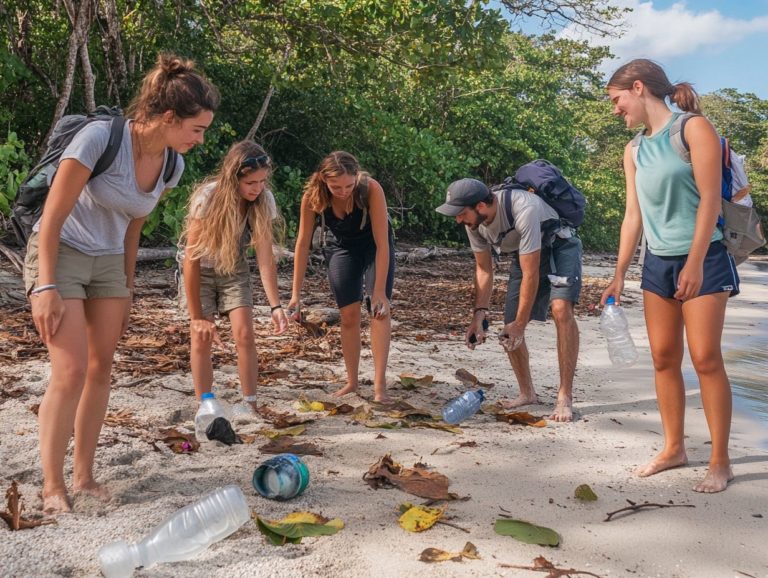The Future of Responsible Travel
Travel has incredible power to transform not just your life but also the places you visit! As you embrace exploration, you ll find that responsible travel is becoming increasingly important. Let s explore what responsible travel means and why it s so important!
This article delves into the meaning of responsible travel, why it matters for the environment and local cultures, and the trends shaping this vital movement. It also addresses the challenges you may face as a traveler and offers practical tips to make your journeys more sustainable.
Together, let s look ahead to the future of responsible travel and the potential benefits it holds for everyone involved. Discover how you can travel mindfully and leave a positive mark on the world.
Contents
- Key Takeaways:
- Understanding Responsible Travel
- The Importance of Responsible Travel
- Exciting Trends in Responsible Travel
- Challenges and Barriers to Responsible Travel
- Ways to Incorporate Responsible Travel into Your Trips
- The Future of Responsible Travel
- How Responsible Travel Benefits Everyone
- Frequently Asked Questions
- 1. What is the importance of responsible travel for the future of our planet?
- 2. How can travelers contribute to responsible travel practices?
- 3. What role do governments and tourism companies play in promoting responsible travel?
- 4. How will responsible travel evolve in the future?
- 5. Is responsible travel only about being environmentally friendly?
- 6. Can responsible travel be affordable for all travelers?
Key Takeaways:

- Prioritize the well-being of local communities and the environment.
- Support local businesses and minimize your impact on the environment.
- Educate yourself and others about responsible travel and sustainable practices.
Understanding Responsible Travel
Understanding responsible travel means exploring practices that emphasize environmental stewardship and cultural sensitivity, which means respecting the traditions and lifestyles of the places you visit. This ensures that tourism aligns harmoniously with local communities while tackling pressing issues like the biodiversity crisis (the loss of plant and animal species) and climate change (the warming of our planet).
By adopting eco-friendly practices, you can significantly reduce your environmental impact and boost local economies through community-focused tourism and sustainable transportation choices.
This comprehensive approach enhances your travel experience, safeguards cultural heritage, and promotes meaningful climate action.
Definition and Principles
The essence of responsible travel is a commitment to eco-friendly practices that prioritize the well-being of local communities and the environment while promoting sustainable tourism models that honor cultural heritage.
This principle encourages you to make conscious choices that greatly impact your destinations. For example, by choosing community homestays over large hotels, you can directly contribute to local economies and ensure your travel dollars benefit the people who call these places home.
Embracing eco-friendly habits such as using public transportation, reducing waste, and supporting local artisans not only minimizes your environmental impact but also enriches your travel experience. To delve deeper, consider exploring the key principles of responsible travel. Sustainable tourism models nurture a reciprocal relationship between visitors and residents, enhancing cultural understanding and preserving natural resources for future generations.
As a truly responsible traveler, you actively seek to leave the places you visit in even better condition than you found them!
The Importance of Responsible Travel
Responsible travel is crucial for reducing the negative impacts of tourism, allowing you to foster sustainable practices that benefit both the planet and local communities.
By prioritizing eco-friendly habits, you can significantly reduce your carbon impact, contribute to biodiversity conservation, and enhance the well-being of residents in the destinations you visit.
This mindful approach supports conservation efforts and helps preserve cultural heritage while promoting tourism sustainability across diverse regions.
Environmental and Social Impact
The environmental and social impacts of the tourism industry can be quite profound. They affect local economies and contribute to carbon emissions that exacerbate global warming and environmental degradation.
As you observe visitors flocking to popular destinations, it becomes clear that fragile ecosystems often suffer from overexploitation. Take coral reefs, for instance. The increasing number of tourists leads to coral bleaching and habitat loss. This underscores the urgent need for sustainable tourism practices.
Communities close to these hotspots may undergo a cultural shift, where local customs become commercialized to cater to tourist expectations, putting their unique identities at risk.
To tackle these challenges effectively, it s essential for stakeholders to embrace responsible tourism initiatives. This includes eco-friendly accommodations and community-based projects that genuinely prioritize the well-being of both the environment and the local populace.
Exciting Trends in Responsible Travel

Current trends in responsible travel reveal an increasing interest in eco-tourism and immersive experiences. These enable you to connect deeply with local cultures while minimizing your environmental footprint.
Destinations like Raja Ampat in Indonesia and Turneff Atoll Marine Reserve in Belize are leading the charge. They embrace sustainable practices and offer eco-certified accommodations alongside luxurious resorts that prioritize environmental responsibility.
Community homestay options and green transportation methods are emerging as popular choices. This highlights a collective commitment to sustainable tourism development, making your travel choices impactful and enriching. To learn more about what lies ahead, check out the future of sustainable travel.
Popular Destinations and Activities
Popular destinations for responsible travel often highlight eco-tourism and community engagement. They invite you to immerse yourself in vibrant cultures. Think places like Raja Ampat in Indonesia, where the allure of snorkeling in crystal-clear waters meets the charm of community homestays in the San Juan Islands.
These amazing places promise unforgettable experiences. Picture yourself exploring underwater realms filled with marine life or participating in traditional fishing practices that connect you to the local heritage. Your travel choices not only enrich your journey but also make a significant impact on local economies.
By engaging in these environmentally sustainable adventures, you become an advocate for initiatives that promote biodiversity conservation and resource preservation. Activities like guided nature walks and explorations of marine protected areas are not just enjoyable; they play a crucial role in safeguarding ecosystems while nurturing a profound appreciation for the role of community in responsible travel and environmental stewardship of the regions you explore.
Challenges and Barriers to Responsible Travel
Despite the growing awareness surrounding responsible travel, numerous challenges and obstacles continue to impede its widespread acceptance. Issues with implementation and a pressing need for improved education among travelers and stakeholders are at the forefront.
Many individuals remain blissfully unaware of the impacts of tourism and how their actions contribute to environmental degradation and climate change. Bridging this knowledge gap is essential for cultivating a culture of responsible tourism. Understanding the impact of responsible travel on local communities not only strengthens local economies but also safeguards invaluable natural and cultural resources.
Act now to make your travel meaningful and impactful! Explore responsible travel options or participate in eco-friendly initiatives.
Issues with Implementation and Education
Issues surrounding the implementation and education in responsible travel primarily arise from a significant lack of awareness and understanding of sustainable practices among both travelers and tour operators.
This knowledge gap creates challenges for adapting travel behaviors that not only reduce environmental impact but also support local economies and cultures. Many travelers harbor misconceptions about sustainable travel, mistakenly believing it to be more expensive or inconvenient. Understanding responsible travel certifications can help dispel these myths and encourage them to make environmentally conscious choices.
Similarly, tour operators frequently find it difficult to incorporate responsible practices into their offerings due to limited resources or training, reinforcing these barriers.
Tackling these issues through effective education and awareness efforts can cultivate a more informed audience eager to embrace and adopt sustainable practices during their travels.
Ways to Incorporate Responsible Travel into Your Trips
Incorporating responsible travel into your journeys is easy and rewarding! Embrace a range of practical tips that prioritize eco-friendly practices and foster community engagement.
Select eco-certified accommodations, harness renewable energy sources, and support local enterprises through the purchase of artisanal products to make a meaningful contribution to minimizing your environmental footprint.
Cultivating cultural awareness and adopting waste reduction strategies will enrich your travel experience and ensure a positive influence on the communities you visit.
Practical Tips and Suggestions

Practical tips for responsible travel call for you to embrace eco-friendly practices. Choose sustainable products, engage in community tourism, and adjust your travel behavior to minimize carbon emissions, which refers to greenhouse gases released by various activities.
To truly make a difference, support local businesses, opt for accommodations that prioritize sustainability, and participate in activities that nurture cultural exchange. This enriches your experience and contributes to the economic well-being of the communities you visit. Additionally, understanding why responsible travel matters more than ever can enhance your journey.
Using public transportation or biking instead of relying on cars can significantly reduce your carbon footprint. Plus, packing light ensures less resource consumption throughout your journey. Join conservation efforts today to make a real difference by volunteering with local environmental organizations or helping preserve natural habitats and participating in marine protected areas.
Transform each trip from a personal adventure into a shared commitment to the planet and the broader biodiversity crisis, understanding the role of social media in responsible travel.
The Future of Responsible Travel
The future of responsible travel shines with promising predictions and potential advancements designed to elevate sustainable tourism and climate action. As the tourism industry grapples with the challenges posed by global warming and environmental degradation, innovative solutions are beginning to take shape, emphasizing sustainable models and practices.
This shows a commitment among stakeholders to forge responsible tourism frameworks that enhance the experience for travelers while protecting local communities and promoting biodiversity conservation within ecosystems.
Start your responsible travel journey today and share your experiences online!
Predictions and Potential Developments
Predictions for the future of responsible travel indicate a significant shift towards sustainable tourism. This shift leverages eco-innovation, which means using new ideas or technologies that are friendly to the environment, ethical travel, and climate action to create enduring impacts.
As you prioritize ethical choices in your travels, expect to see a growing array of eco-friendly accommodations, carbon offset programs, and initiatives that engage local communities. Innovations like smart technology for resource management and sustainable transport options will likely become more prevalent, including the future of sustainable accommodations, enabling you to minimize your environmental footprint while exploring a variety of destinations.
The rise of regenerative travel, which focuses on leaving places in better condition than you found them, is poised to reshape the standards of responsibility in tourism. This evolution aligns with changing consumer preferences and embodies a collective dedication to preserving our planet for future generations, paving the way for the future of sustainable travel destinations.
How Responsible Travel Benefits Everyone
Join the movement! Responsible travel benefits everyone involved, creating a positive impact on local communities, enhancing environmental advantages, and promoting biodiversity conservation.
When you engage in community tourism and support local artisans, you foster economic development while preserving cultural heritage and traditions. This reciprocal relationship ensures that tourism contributes to the sustainability of ecosystems and the well-being of local populations, enabling a harmonious coexistence between you and the residents you encounter. Additionally, understanding the significance of travel insurance in responsible travel is crucial for safeguarding your journey.
Positive Impact on Local Communities and the Environment
The positive impact of responsible travel is strikingly clear in its ability to elevate local communities and yield environmental benefits. It paves the way for sustainable tourism development and cultural preservation.
When you choose to engage with local artisans and purchase handmade goods, you’re not just a traveler; you’re a vital contributor to the economic stability of these communities. In areas where traditional crafts are at risk of disappearing, your support for local markets plays a crucial role in maintaining these cherished cultural practices for future generations.
Adopting eco-friendly practices, such as participating in wildlife conservation programs, allows you to actively contribute to vital environmental protection efforts. These initiatives are not just about conservation; they often lead to the preservation of natural habitats and the promotion of biodiversity, ensuring that both the environment and local cultures thrive in harmony with tourism.
Frequently Asked Questions

1. What is the importance of responsible travel for the future of our planet?
Responsible travel is vital for our planet’s future! It supports sustainable tourism practices that minimize negative impacts on the environment, culture, and economy of a destination. It promotes a more responsible and ethical way of traveling that benefits both local communities and the environment.
2. How can travelers contribute to responsible travel practices?
Travelers can:
- Choose eco-friendly accommodations
- Support local businesses
- Reduce their carbon footprint
- Respect local customs
They can also educate themselves about the customs and traditions of the places they visit and respect them.
3. What role do governments and tourism companies play in promoting responsible travel?
Governments and tourism companies play a crucial role in promoting responsible travel by implementing policies and regulations that support sustainable tourism. They invest in eco-friendly infrastructure and offer responsible travel options to their customers. Furthermore, they have a responsibility to educate travelers about the importance of responsible travel and its impact on the environment and local communities.
4. How will responsible travel evolve in the future?
The future of responsible travel will focus on traveling in a way that protects the environment. Expect stricter carbon emission regulations and more support for local communities. Eco-friendly initiatives and cultural appreciation will also be key.
5. Is responsible travel only about being environmentally friendly?
No, responsible travel is about much more than just being eco-friendly. It includes ethical practices that benefit local communities and cultures. Responsible travel promotes a holistic approach that considers social, economic, and environmental impacts.
6. Can responsible travel be affordable for all travelers?
Absolutely! Responsible travel can be affordable for everyone. There are budget-friendly eco-friendly accommodations and tours available. By supporting local businesses and making thoughtful choices, travelers can minimize their carbon footprint. Remember, responsible travel isn t just for the wealthy; it s for anyone who wants to make a positive impact!






